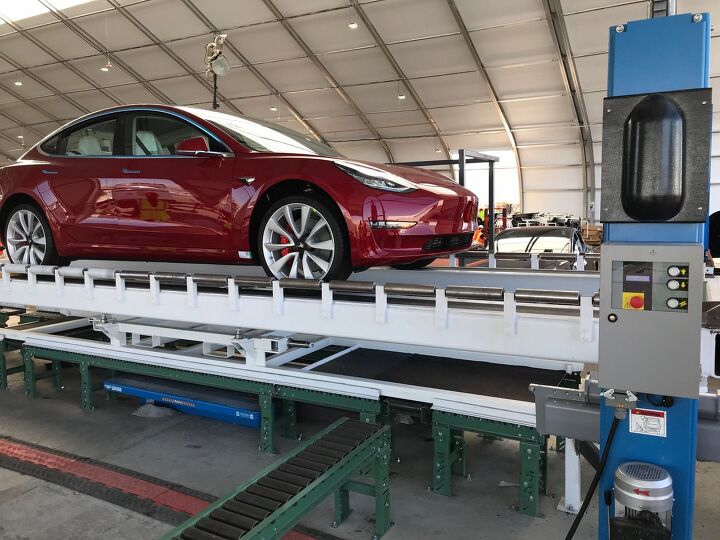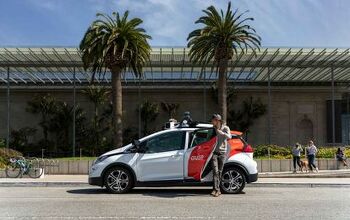Tesla Board Members Pipe Up on Musk's Going-private Plan

Six members of the Tesla board of directors issued a statement Wednesday, claiming CEO Elon Musk spoke to them last week about his plan to take the publicly traded company private. Musk shocked investors and analysts Tuesday after he tweeted his vision of the automaker’s corporate future, claiming funding existed to pull it off. He later shared an internal email to employees on the company’s blog.
Though Musk’s blog post doesn’t mention how he’d bankroll such a massive buyout, the company’s board says he discussed the funding issue with them.
The statement from board members Brad Buss, Robyn Denholm, Ira Ehrenpreis, Antonio Gracias, Linda Johnson Rice, and James Murdoch was brief:
Last week, Elon opened a discussion with the board about taking the company private. This included discussion as to how being private could better serve Tesla’s long-term interests, and also addressed the funding for this to occur. The board has met several times over the last week and is taking the appropriate next steps to evaluate this.
Musk envisions taking the company private at $420 a share, which means a deal of roughly $72 billion. While he cautioned that a final decision has not been made (the board would obviously like a say), the CEO did claim via Twitter that funding was secured, raising the obvious question: who’s going to put up the dough to buy back all those shares?
CNBC contacted several Wall Street banks, all of which hadn’t heard a peep about Musk’s plan. Reuters, noting that Musk’s plan, if it comes to pass, would be the largest leveraged buyout of all time, speculated on which equity partners could handle such a deal. One possibility is Saudi Arabia’s Public Investment Fund, which recently bought a stake of close to 5 percent. Another is China’s Tencent Holdings Ltd, which also owns a 5 percent stake in the automaker.
Still, Musk wrote that he’d prefer as many shareholders as possible retain their stake, which would make the buyout a cheaper proposition.
The plan isn’t sitting well with many. Speaking to Reuters, NordLB analyst Frank Schwope said, “Who gives $30 to $50 billion to buy back the shares? And if you stay as a shareholder you get less information than before and you depend more and more on Elon Musk.”
In a note, Barclay’s wrote, “This is out there, even for Tesla. Buyout would require about $70 billion: roughly $60 billion for equity and about $10 billion to take out debt. With 145 million shares, a buyout at $420/share would require $60 billion to take out all public shareholders.
Morgan Stanley wrote that it sympathized with Musk’s reasoning, adding that the desire to take Tesla private indicates either an imminent return to profitability or the discovery of a previously absent source of capital. However, it asked, “If Tesla’s CEO really wanted to go private… why announce it to the world in this way… which could significantly contribute to the required premium and financial leverage?
The company isn’t profitable, it still faces a mountain of production challenges, and its CEO is well known for his controversial remarks and decisions. Still, the benefits for a company (and CEO) that likes to keep things close to the vest are clear. Musk laid this out in Tuesday’s blog post.
Many analysts and observers spent Tuesday pointing out that, by tweeting out this bombshell, Musk has a very limited time in which to inform the U.S. Securities and Exchange Commission of his intentions — or risk running afoul of the law.
[Image: Elon Musk/Twitter]

More by Steph Willems
Latest Car Reviews
Read moreLatest Product Reviews
Read moreRecent Comments
- Fahrvergnugen The only GP we watch - and attend - is SailGP. Feeds a slightly different bunch of adrenaline junkies, though there must be some overlap.
- SCE to AUX Fisker filed for reorganization in Austria - the end is near.https://insideevs.com/news/718875/fisker-reorganization-austria/
- Bd2 I'll watch F1 when Kia and/or Hyundai pony (pun intended) up the cash to field a class leading team. Hyundai is leading many series with the Elantra N with it's incredible 350HP Smartstream-N engine.
- MaintenanceCosts More or less an admission that the radar-only cars will never do anything that could reasonably be marketed as "Full Self-Driving."
- Bd2 The coolest true SUV on the market. Change my mind.


































Comments
Join the conversation
"But I do know that Tesla with just a single model outsells every car model offered by BMW in America. All of them. Combined. Crushed by the Model 3" Only if you restrict yourself to compare the initial sales burst of a car that has been preordered for years and years, to the simple business as usual sales of a more normal automaker. Per that method of counting, virtually every single current one-hit-wonder outsells the Beatles for the first heady few weeks his hit's release, as well. IOW, it's not an incorrect statement per se, but it isn't necessarily all that relevant a metric either. OTOH, if you look at who has sold the most cars up until now, BMW or the Model 3; BMW still looks very much to be the Beatles in that comparison.....
You're not supposed to make statements like that.